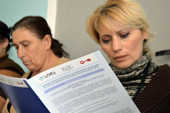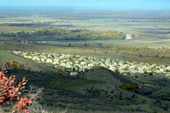
Eco migrants to start their businesses in remote parts of Georgia
By Etuna Tsotniashvili
Tuesday, November 17
Civil Development Agency (CiDA), along with partner organizations, is implementing an EU funded project in two regions of Georgia, namely Kvemo Kartli and Kakheti. The project, named Raising the Economical and Infrastructural Capabilities of Eco-Migrants in Managing the Migration Process, aims to strengthen economic and infrastructural opportunities for eco migrants in those regions.
As part of the project, CiDA announced a grant call to support the business activities of eco migrant women in both regions. To introduce the aim and terms of the project, CiDA representatives visited two villages of the Kakheti region - Erisimedi and Samtatskaro - which are populated by eco migrants from the mountainous Adjara region of western Georgia. CiDA’s project representatives introduced locals to the conditions of the grant, and explained why it is so important for them to participate in the call; if they succeed, they will have the opportunity to start their business in the village, which will significantly increase their income.
The villages are located near to the Georgian-Azerbaijani border line and none are far from the closest municipality of Dedoplistskaro, although due to the damaged roads it (such as Erisimedi), almost 50 minutes are needed to cover a 25 km distance.
As soon as one arrives, it is apparent that both of the villages are very poor, with a damaged infrastructure, with houses and an irrigation system in dire need of repair. One may be surprised to learn that they do not even have a small food store or pharmacy; villagers must go at least twice a week to get to the closest town and buy basic necessities.
“A total of 1600 people live in our village and their main income is from grape production, although it needs a lot of effort, work and money to take proper care of the vineyards. What is important for us women, is that the grant competition is for females, which gives us the chance to become more active, to set our goals and employ ourselves and others,” says Gulo Nadirashvili from Samtatskaro. Nadirashvili highlighted the fact that young people leave the village when they get the opportunity; some of them go to Turkey for seasonal work, while others go to Adjara in the summertime to find some jobs, but in winter the village is virtually shut down, as there is nothing to do.
Zhana Tavartkiladze is from Khulo (a mountainous village of Adjara) and in 1989 she and her family were made to leave their village due to an ecological catastrophe, and migrated to the Kakhetian village of Erisimedi. She is now employed in local kindergarten, and her main concern is that her family members - as well as many in the neighbourhood – all live in poor economic conditions.
“The situation is really bad and we all know it. We live in a remote village, and if any of us feels bad we do not even have a hope that a doctor will come on time because of the terrible road. We do not have even a small store or shop where we could buy basic necessities; having a pharmacy is crucially important for any community. I have just heard about the project and the grant call, and I have a friend who knows about the pharmaceutical issue and maybe she will be interested to open a small pharmacy shop in the village,” said Zhana.
“When we were thinking about the project proposal, we visited those two villages and became stressed; we instantly realized we should have done something beneficial for those people who live in such unbearable conditions,” said one of the project staff of CiDA, Shorena Kochlamazashvili, and vividly recalls her first visit to the villages: “We came here and said we are announcing a grant call, so please name some things you do not have in the village but you want to have. The answer was ‘we have nothing in the village’. Taking into account all these issues, we will do our best with our partner organizations to make their hopes realistic,” Kochlamazashvili said.
Raising the Economical and Infrastructural Capabilities of Eco-Migrants in Managing the Migration Process is financed by the European Union, and is being implemented in seven villages of the Kakheti and Kvemo Kartli regions. The project is implemented by CiDA and its partner organizations, Regions Development Center and SIQA.



